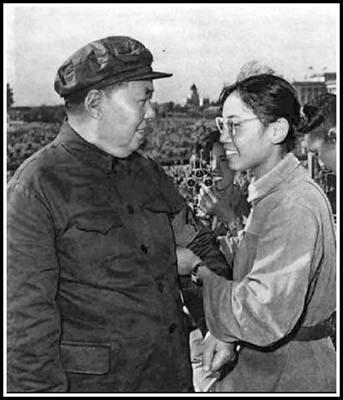Almost fifty years ago, during the opening moves of China’s Cultural Revolution in 1966, Beijing schoolgirl and prominent “Red Guard” Song Binbin helped spark an escalating series of violent criticism and struggle sessions at her school that resulted in the bloody death of the principal.
Now the aging Song says she’s sorry.
Song Binbin, whom Mao Zedong famously met and gave the nickname “Yaowu,” meaning “WIlling to Fight,” appeared at the Beijing Normal University-affiliated girls’ school on Jan. 12, giving a 1500-character speech of repentance.
“Please allow me to express my everlasting solicitude and apologies to Principal Bian,” she told a group of former teachers and students, according to a report by the Beijing Times. “I failed to properly protect the school leaders, and this has been a lifelong source of anguish and remorse.”
The daughter of admiral Song Renqiong, one of communist China’s founding leaders, Song Binbin was in 1966 a senior leader among the Red Guards at her girls’ school in Beijing. The Red Guards, created to further Mao’s aims in the Cultural Revolution, brought untold chaos to the country’s institutions and social framework.
That June, Song penned what is known as a “big-character poster” criticizing the school leadership. It culminated in August with a deadly mob beating the school’s Communist Party secretary and deputy headmaster, Bian Zhongyun.
“The Cultural Revolution was a massive calamity,” Song said, according to a text of her statement published on “Consensus Net,” a Chinese website that specializes in intellectual and political discussions. A photo of Song and other former students bowed before a bust of Ms. Bian appeared in Chinese newspapers.
The headmaster’s killing was but one of the first and most well-known of its kind.
“In the following days, the violence escalated. As a result, more and more teachers were beaten and many died,” according to research by U.S. professor Wang Youqin, who herself was a former Red Guard. About 100 were tortured to death in a single district of central Beijing within two weeks in August 1966 and many more were left disabled.
Song said she was inspired by the apology by Chen Xiaolu, the son of another top communist official. “We saw that society recognized his apology. This is an opportunity. We hope more people can know the truth,” Song said.
The Cultural Revolution was a political campaign launched by Mao Zedong, the former leader of the Chinese Communist Party and the founder of the People’s Republic of China, to curb the authority of perceived ideological enemies and claw back his power in the Party after the disastrous Great Leap Forward, in which tens of millions of people starved to death.
Initially its base of support came from the children of top Party officials, including Song, who looked to demonstrate their revolutionary credentials. Soon this early group of Red Guards was forsaken by Mao and left open to attack by other groups in an escalating cycle of violent struggle.
The effects of the Cultural Revolution were incredibly widespread. Current party head Xi Jinping and his father Xi Zhongxun are among its victims. The elder Xi was dismissed from the position of vice premier of the Communist Party’s state council, becoming the target of investigation and detention. Xi Jinping himself, then a young boy, was denounced, starved, left homeless, and detained. In early 1969, the 16 year old Xi was sent to work in a rural area in Northern Shaanxi, Province, where he spent seven years laboring in miserable conditions.
Wang Jingyao, Bian Zhongyun’s 93-year-old widower, has long worked to preserve his late wife’s memory, as well as raise awareness of the role played by Ms. Song and others in the death.
“She is a bad person because of what she did,” he said in an interview with The New York Times. “She and the others were supported by Mao Zedong. Mao was the source of all evil. He did so much that was bad. And it’s not just an individual problem” of someone like Ms. Song, he added. “The entire Communist Party and Mao Zedong are also responsible.”
Red Guard-Cum-Red Aristocrat Apologizes for Killing Teacher
A Chinese woman who helped to kill her school principal during the Cultural Revolution has come to the public and offered a remorseful apology.

Song Binbin (R) is putting a Red Guard armband on Chairman Mao Zedong’s (L) arm at Tiananmen on Aug. 18, 1966. Screenshot/163.com/Epoch Times
|Updated:
Leo Timm is a freelance contributor to The Epoch Times. He covers Chinese politics, society, and current affairs.
Author’s Selected Articles



